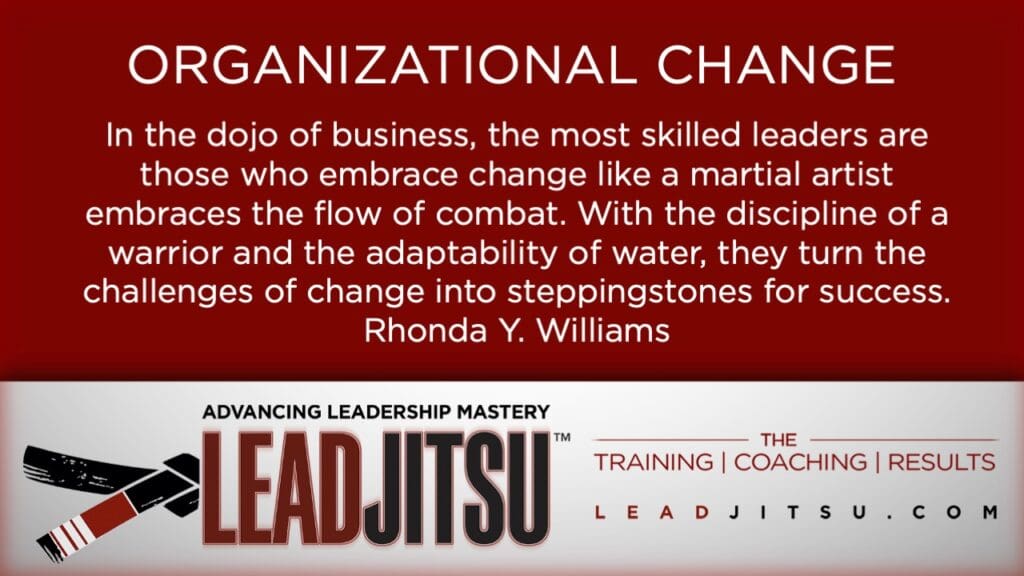Navigating the Tides of Change
Change is the only constant in today’s fast-paced business world. Organizations are continuously evolving, driven by technological advancements, market shifts, and societal trends. This constant state of flux can be daunting, but for those trained in the art of LEADJITSU leadership, change becomes an opportunity for growth and innovation.
The Startling Reality of Change Management
Recent statistics paint a clear picture of the challenges organizations face in managing change:
- 70% of change initiatives fail to achieve their goals, largely due to employee resistance and lack of management support. (McKinsey)
- Only 27% of organizations report successful change management initiatives. (Gartner)
- 1 in 3 change projects fail because senior leaders don’t act as role models for change. (Kotter International)
These figures underscore a significant gap in effective change management within many organizations. But where does LEADJITSU fit into this picture?
The Startling Reality of Change Management
Recent statistics paint a clear picture of the challenges organizations face in managing change:
- 70% of change initiatives fail to achieve their goals, largely due to employee resistance and lack of management support. (McKinsey)
- Only 27% of organizations report successful change management initiatives. (Gartner)
- 1 in 3 change projects fail because senior leaders don’t act as role models for change. (Kotter International)
These figures underscore a significant gap in effective change management within many organizations. But where does LEADJITSU fit into this picture?
LEADJITSU Leaders: Masters of Change
LEADJITSU, a leadership philosophy that merges martial arts principles with modern leadership strategies, prepares leaders to excel in environments of constant change. The core tenets of LEADJITSU – discipline, adaptability, strategic foresight, and empathetic connection – equip leaders with the skills to not only manage change but to thrive in it.
Discipline and Adaptability
Change management requires a disciplined approach, one that is methodical yet flexible. LEADJITSU leaders, akin to skilled martial artists, are trained to maintain focus and clarity, even in chaotic situations. Their adaptability allows them to pivot strategies quickly and effectively, ensuring that their teams are always aligned with evolving organizational goals.
Strategic Foresight
LEADJITSU leaders practice ‘Strategic Foresight’, anticipating changes and preparing their teams accordingly. This proactive stance enables them to mitigate risks and seize opportunities that come with change, positioning their organizations a step ahead of the competition.
Empathetic Connection
At the heart of effective change management is the ability to understand and connect with people. LEADJITSU leaders excel in building empathetic relationships within their teams, fostering an environment where change is embraced, not feared. This empathetic approach ensures that team members feel valued and heard, increasing their willingness to adapt and adopt new practices.
LEADJITSU, a leadership philosophy that merges martial arts principles with modern leadership strategies, prepares leaders to excel in environments of constant change. The core tenets of LEADJITSU – discipline, adaptability, strategic foresight, and empathetic connection – equip leaders with the skills to not only manage change but to thrive in it.
Discipline and Adaptability
Change management requires a disciplined approach, one that is methodical yet flexible. LEADJITSU leaders, akin to skilled martial artists, are trained to maintain focus and clarity, even in chaotic situations. Their adaptability allows them to pivot strategies quickly and effectively, ensuring that their teams are always aligned with evolving organizational goals.
Strategic Foresight
LEADJITSU leaders practice ‘Strategic Foresight’, anticipating changes and preparing their teams accordingly. This proactive stance enables them to mitigate risks and seize opportunities that come with change, positioning their organizations a step ahead of the competition.
Empathetic Connection
At the heart of effective change management is the ability to understand and connect with people. LEADJITSU leaders excel in building empathetic relationships within their teams, fostering an environment where change is embraced, not feared. This empathetic approach ensures that team members feel valued and heard, increasing their willingness to adapt and adopt new practices.

The Value of Effective Change Leadership
Leaders who excel in change management contribute significantly to their organizations:
- Companies with effective change management are six times more likely to achieve project objectives and twice as likely to stay on schedule and within budget. (Prosci)
- Effective change leadership results in 30% higher customer satisfaction rates and 65% improvement in employee performance. (Forbes)
Let’s partner to introduce your team to LEADJITSU leadership.
Schedule a 15-minute call to learn more!
– – – – –
LEADJITSU – The vision, artistry, and discipline of superb leadership.
The Training | The Coaching | The Culture | The Results
For Leaders and For Teams
